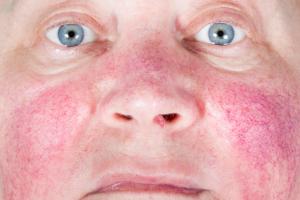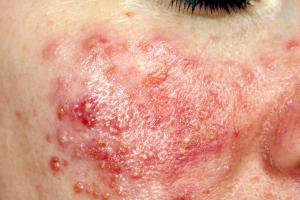Rosacea
Rosacea is a common long-term skin condition that mainly affects the face. It can be controlled, to some degree, with long-term treatment. Sometimes the changes in physical appearance can have a significant psychological impact. You should see your GP if you have persistent symptoms, that could be caused by rosacea.
Symptoms of rosacea
Symptoms often begin with episodes of flushing, where the skin turns red for a short period.
Other symptoms can develop as the condition progresses, such as:
- burning and stinging sensations
- permanent redness
- spots (papules and pustules)
- small blood vessels in the skin becoming visible


Rosacea is a relapsing condition. There will be periods when symptoms are particularly bad, but less severe at others.
When to see your GP
See your GP if you have persistent symptoms that could be caused by rosacea.
Early diagnosis and treatment can help stop the condition getting worse.
There's no specific test for rosacea, but your GP will often be able to diagnose the condition by:
- examining your skin
- asking about your symptoms
- asking about possible triggers you may have
Your GP may arrange further tests to rule out other conditions with similar symptoms, such as:
Causes of rosacea
The exact cause of rosacea is unknown, although a number of possible factors have been suggested, including:
- abnormalities in the blood vessels of the face
- a reaction to microscopic mites commonly found on the face
Although they're not thought to be direct causes of the condition, several triggers have been identified that may make rosacea worse.
These include:
- exposure to sunlight
- stress
- strenuous exercise
- hot or cold weather
- hot drinks
- alcohol and caffeine
- certain foods, such as spicy foods
Treating rosacea
There's no cure for rosacea, but treatment can help control the symptoms.
Long-term treatment is usually necessary. Although there may be periods when your symptoms improve and you can stop treatment temporarily.
For most people, treatment involves a combination of self-help measures and medication, such as:
- avoiding known triggers – for example, avoiding drinks containing alcohol or caffeine
- creams and gels – medications applied directly to the skin to reduce spots and redness
- oral medications – tablets or capsules that can help clear up more severe spots, such as oral antibiotics
You may be referred to a dermatologist (skin specialist) for treatment if your rosacea is not responding to treatment.
Living with rosacea
Any long-term (chronic) condition can have an adverse psychological effect.
Rosacea can be particularly troublesome as it affects your appearance. This can change how you feel about yourself and how you interact with others.
Many people with rosacea have reported feelings of:
- low self-esteem
- embarrassment
- frustration
It's important to try to come to terms with the fact you have a chronic condition that, although incurable, is controllable.
Persevering with your treatment plan and avoiding your triggers are the best ways of controlling your symptoms.
As your physical symptoms improve, you may start to feel better psychologically and emotionally.
Speak to your GP if you're feeling depressed as a result of your condition. They may recommend further treatment if necessary.
Ocular rosacea
Rosacea that affects your eyes (ocular rosacea) can lead to a number of eye problems, some of which can be serious.
Symptoms of ocular rosacea can include:
- feeling like there is something in your eyes
- dry eyes
- irritated and bloodshot eyes
- inflammation of the eyelids (blepharitis)
Rosacea can sometimes cause the cornea to become inflamed and damaged. This is known as keratitis.
This damage can make the cornea vulnerable to:
- ulceration
- infection
This could potentially threaten your sight.
Symptoms of serious problems with your corneas include:
- eye pain
- sensitivity to light (photophobia)
- deterioration in your vision
Contact your GP immediately if you think you may have a problem with your corneas. If this isn't possible, contact urgent and emergency care services.
If keratitis isn't treated quickly there's a risk of permanent vision loss.
More useful links
The information on this page has been adapted from original content from the NHS website.
For further information see terms and conditions.